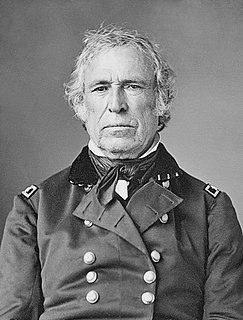A Quote by Zachary Taylor
The power given by the Constitution to the Executive to interpose his veto is a high conservative power; but in my opinion it should never be exercised except in cases of clear violation of the Constitution, or manifest haste and want of due consideration by Congress.
Related Quotes
The principle of the Constitution is that of a separation of legislative, Executive and Judiciary functions, except in cases specified. If this principle be not expressed in direct terms, it is clearly the spirit of the Constitution, and it ought to be so commented and acted on by every friend of free government.
The prohibition amendment to the Constitution requires the Congress. and the President to provide adequate laws to prevent its violation. It is my duty to enforce such laws.To prevent smuggling, the Coast Card should be greatly strengthened, and a supply of swift power boats should be provided. The major sources of production should be rigidly regulated, and every effort should be made to suppress interstate traffic... It is the duty of a citizen not only to observe the law but to let it be known that he is opposed to its violation.
A constitution is not the act of a government, but of a people constituting a government; and government without a constitution is power without a right. All power exercised over a nation, must have some beginning. It must be either delegated, or assumed. There are not other sources. All delegated power is trust, and all assumed power is usurpation. Time does not alter the nature and quality of either.
The question whether the judges are invested with exclusive authority to decide on the constitutionality of a law has been heretofore a subject of consideration with me in the exercise of official duties. Certainly there is not a word in the Constitution which has given that power to them more than to the Executive or Legislative branches.
In explaining the Constitution, James Madison, the acknowledged father of the Constitution, wrote in Federalist Paper 45: 'The powers delegated by the proposed Constitution to the Federal government are few and defined. Those which are to remain in the State governments are numerous and indefinite. The former will be exercised principally on external objects, as war, peach, negotiation, and foreign commerce.' Has the Constitution been amended to permit Congress to tax, spend and regulate as it pleases or have Americans said, 'To hell with the Constitution'?
More fundamentally, however, the answer to petitioners' objection is that there can be no impairment of executive power, whether on the state or federal level, where actions pursuant to that power are impermissible under the Constitution. Where there is no power, there can be no impairment of power.
The provision of the Constitution giving the war making power to Congress was dictated, as I understand it, by the following reasons: Kings had always been involving and impoverishing their people in wars, pretending generally, if not always, that the good of the people was the object. This our convention understood to be the most oppressive of all kingly oppressions, and they resolved to so frame the constitution that no man should hold the power of bringing this oppression upon us.
I was very, very concerned about President Obama and how much executive order and how much executive power he tried to exert. But I think I want to be, and I think congress will be, a check on any executive, Republican or Democrat, that tries to grasp too much power. And really, a lot of the fault is not only presidents trying to take too much power, it's Congress giving up too much power.
The veto is a President's Constitutional right, given to him by the drafters of the Constitution because they wanted it as a checkagainst irresponsible Congressional action. The veto forces Congress to take another look at legislation that has been passed. I think this is a responsible tool for a president of the United States, and I have sought to use it responsibly.





























